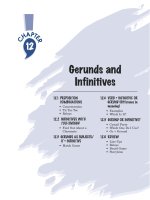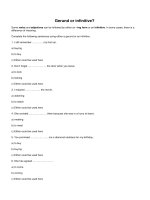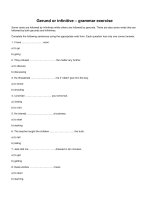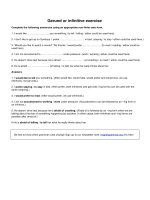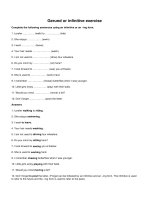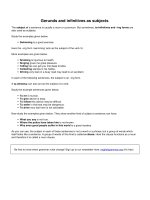Gerunds and Infinitives: Verb + Gerund or Infinitive potx
Bạn đang xem bản rút gọn của tài liệu. Xem và tải ngay bản đầy đủ của tài liệu tại đây (61.81 KB, 2 trang )
Gerunds and Infinitives: Verb + Gerund or Infinitive
Some verbs can be followed by an infinitive or a gerund. These verbs in turn can be
subdivided into two groups, verbs with little difference in meaning, and verbs with a distinct
change in meaning.
Verb + Gerund or Infinitive: Little difference in meaning.
Here are some common verbs that can be followed by gerunds or infinitives with little
change in meaning. A change of meaning may still exist however, as there are almost
limitless combinations of verbs and gerunds/infinitives.
begin - She began to sing. - He began working here last year.
bother - Don't bother to wash the dishes. I'll do it. - Don't bother washing the dishes. I'll do
it.
continue - You can continue to live here for 6 months. - You can continue living here for 6
months.
start - I started to learn the clarinet when I was 8. I started learning the clarinet when I was
8.
love / like / hate /prefer
These four verbs use the gerund for situations or actions in progress. The infinitive is used
for factual information.
hate
- I hate working at my new job (I'm workng there now.)
- I hate to work on Sundays. (specific time and situation)
like
- I like playing the piano. (I like the process andfeeling of playing the piano.)
- I like to play the piano. (It's a fact I like to play the piano.)
love
- I love living in the country. (I'm probably living there now.)
- I love to live in the country. (Generally speaking I like the country, maybe I'm not living
there now.)
prefer
- I prefer to study by myself. (Sounds factual)
- I prefer studying by myself. (Sounds more personal, perhaps I'm studying now.)
These verbs are also often used with would and the infinitive, and refer to specific
situations. For example:
- I would love to go to China.
- We would prefer to meet at 7.00.
Allow / permit
Allow and permit have one pattern for gerunds and another for infinitives.
allow + gerund - My teacher doesn't allow eating in class.
allow + object + infinitive - My teacher doesn't allow us to eat in class.
permit + gerund - My teacher doesn't permit eating in class.
permit + object + infinitive - My teacher doesn't permit us to eat in class.

